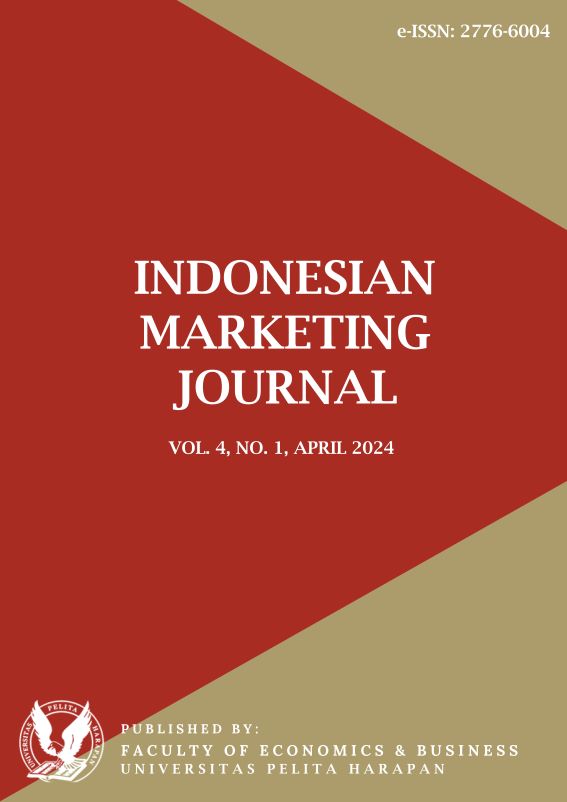PENGEMBANGAN PRODUKSI DAN DIGITALISASI PEMASARAN BAGI UMKM DI SEKTOR KULINER COOKED BY ANNISA (HASIL LUARAN PKM) [PRODUCTION DEVELOPMENT AND MARKETING DIGITALIZATION FOR UMKM IN THE CULINARY SECTOR COOKED BY ANNISA (PKM OUTPUT RESULTS)]
DOI:
https://doi.org/10.19166/imj.v4i1.9677Keywords:
Culinary MSMEs, Digital Marketing, Product Innovation, Operational Efficiency, Business Transformation, [UMKM Kuliner, Pemasaran Digital, Inovasi Produk, Efisiensi Operasional, Transformasi usaha]Abstract
Cooked by Annisa" is a home-based culinary business established in 2020, focusing on offering high-quality food products such as pastries and Japanese specialties. The business faces several challenges, including limited production capacity, restricted market access, and a shortage of human and financial resources. This article outlines proposed solutions to address these issues through digital marketing strategies, a pre-order and pick-up point system, new product development, operational enhancements, and the adoption of digital technologies. These initiatives aim to boost competitiveness, expand market reach, and transform the business into a sustainable and adaptive MSME in the global food sector. The article also presents risk analysis, and key lessons learned in managing a digitally driven and innovative-focused small enterprise.
Abstrak Bahasa Indonesia: Cooked by Annisa" adalah usaha kuliner rumahan yang berdiri sejak tahun 2020 dan berfokus pada penyediaan produk makanan berkualitas, seperti pastry dan hidangan khas Jepang. Dalam perjalanannya, usaha ini menghadapi tantangan seperti keterbatasan kapasitas produksi, akses pasar yang terbatas, serta minimnya sumber daya manusia dan pembiayaan. Artikel ini membahas solusi yang diusulkan untuk mengatasi tantangan tersebut melalui strategi pemasaran digital, sistem pre-order dan pick-up point, pengembangan produk baru, serta peningkatan operasional dan adopsi teknologi digital. Dengan pendekatan ini, diharapkan usaha dapat meningkatkan daya saing, memperluas pasar, dan bertransformasi menjadi UMKM kuliner yang berkelanjutan dan adaptif terhadap perubahan pasar global. Artikel ini juga menganalisis risiko dan pelajaran yang dipetik dalam pengelolaan usaha kecil berbasis digital dan inovasi.
References
Beck, T., Demirguc-Kunt, A., & Levine, R. (2005). SMEs, growth, and poverty: Cross-country evidence. Journal of Economic Growth, 10(3), 199–229. https://doi.org/10.1007/s10887-005-3533-5
Chaffey, D., & Ellis-Chadwick, F. (2019). Digital marketing: Strategy, implementation, and practice (7th ed.). Pearson Education.
Gómez, J., Martínez Costa, C., & Martínez Lorente, Á. R. (2017). IT and quality management in developing countries: An analysis in SMEs. Technological Forecasting and Social Change, 117, 246–258.
Linton, J. D., & Solomon, G. T. (2017). Technology, innovation, entrepreneurship and the small business—Technology and innovation in small business. Journal of Small Business Management, 55(2), 196–199. https://doi.org/10.1111/jsbm.12311
Rosli, M. M., & Sidek, S. (2013). The impact of innovation on the performance of small and medium manufacturing enterprises: Evidence from Malaysia. Journal of Innovation Management in Small and Medium Enterprise, 2013, 1–16. https://doi.org/10.5171/2013.885666
Susanti, D., Lestari, M., & Pratama, A. (2021). Transformasi digital UMKM di era pandemi COVID-19: Strategi dan tantangan. Jurnal Ekonomi dan Bisnis Digital, 2(1), 12–22. https://doi.org/10.33005/jebd.v2i1.45
Tiago, M. T. P. M. B., & Veríssimo, J. M. C. (2014). Digital marketing and social media: Why bother?. Business Horizons, 57(6), 703–708. https://doi.org/10.1016/j.bushor.2014.07.002
Trott, P. (2021). Innovation management and new product development (7th ed.). Pearson Education.
Downloads
Published
Issue
Section
License
Copyright (c) 2025 Dewi Wuisan, Yohana F. Cahya Palupi Meilani, Anindhira Shinta, Alexandra Felicia Tanawa, Mega Irene Agustina, Niputu Evelyna Devi Ariana, Puan Maharani, Shaquila Salsabil

This work is licensed under a Creative Commons Attribution-ShareAlike 4.0 International License.
Authors who publish with this journal agree to the following terms:
1) Authors retain copyright and grant the journal right of first publication with the work simultaneously licensed under a Creative Commons Attribution License (CC-BY-SA 4.0) that allows others to share the work with an acknowledgement of the work's authorship and initial publication in this journal.
2) Authors are able to enter into separate, additional contractual arrangements for the non-exclusive distribution of the journal's published version of the work (e.g., post it to an institutional repository or publish it in a book), with an acknowledgement of its initial publication in this journal.
3) Authors are permitted and encouraged to post their work online (e.g., in institutional repositories or on their website). The final published PDF should be used and bibliographic details that credit the publication in this journal should be included.


